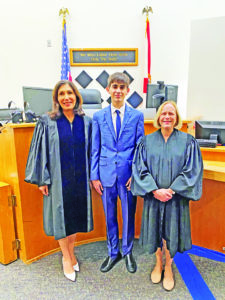|
Getting your Trinity Audio player ready...
|
 As Miami Teen Court enters its 25th Year, I feel honored to be part of the program at the North Dade Justice Center to help give Miami youth offenders a second chance to demonstrate their positivity through Teen Court. The organization is entering its 25th anniversary in the pursuit of servicing first-time youth offenders in Miami-Dade county through alternative trial proceedings.
As Miami Teen Court enters its 25th Year, I feel honored to be part of the program at the North Dade Justice Center to help give Miami youth offenders a second chance to demonstrate their positivity through Teen Court. The organization is entering its 25th anniversary in the pursuit of servicing first-time youth offenders in Miami-Dade county through alternative trial proceedings.
As a volunteer, I had the privilege of serving as a student defense attorney as we try and sanction student peers in front of an active judge or lawyer instead of the traditional juvenile judicial system. I joined for the purpose of ensuring that a juvenile’s singular mistake wouldn’t emblazon them with a scarlet letter for the rest of their life. In the traditional system, a juvenile who is found guilty would be given a stained record and forced to isolate themselves from their life in reparation for their mistake. However, Teen Court allows them to avoid this path and purges their record of wrongdoings upon the completion of their sanctions. From writing an apologetic letter to those they wronged, an open apology to a parent in court, working community service, serving as a Teen Court juror, and/or writing an essay explaining the wrongfulness of their criminal act, the Teen Court process is a chance for a participant to learn and value the progression of righting a mistake.
It has been a mind-opening and remarkable process to take part in. Through Teen Court, I am able to help students like myself, and first-time youth offenders understand the meaning of thinking twice before committing to their actions – which translates into veering from a troubled life in the future. Additionally, I appreciated the verbiage that was consistently used throughout our proceedings. The judge, when giving decisions, refrained from using words like “defendant” and “guilty” and, instead, referred to the juveniles as “participants” and would deem them either “remorseful” or “not remorseful.” This demonstrates the program’s emphasis on the judicial system being a tool for growth and understanding instead of a vehicle for punishment. The purpose is to curb future run-ins with the law through maturity instead of seclusion.
Teen Court also gave me the possibility to gain hands-on experience as I introduce myself to the legal profession. The upgrade in my overall confidence through weekly engagements as a communicator before a judge and jury has been palpable through opening and closing arguments, witness questioning, and raising objections in my client’s defense. In addition, the pressure of debating on behalf of a charged participant has helped me put the adjacent obstacles in my life into more subjective perspectives.
In recognition of the program’s 25th anniversary, it’s my goal to organize a public occasion to celebrate Miami Teen Court. My idea would be to heighten the visibility and awareness for the good that Teen Court is able to produce while recognizing administrators from the Miami-Dade Advocacy Trust and its student and adult volunteers. These are the people who have allowed it to become the success that it is over the years. Hopefully, other cities around Florida and the nation can look to Miami-Dade as a guide to starting their own Teen Courts after they notice the wealth of justice that it is able to provide for our youth. In almost 25 years, over 7,800 second chances have been delivered to first-time youth offenders, accompanied by a recidivism rate of below 3%. Spreading the success of Miami’s Teen Court can be a step towards healing our country.





